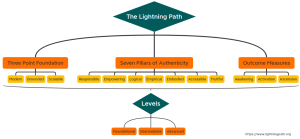The Lightning Path: Difference between revisions
An Avatar.Global Resource
No edit summary |
No edit summary |
||
| Line 2: | Line 2: | ||
<h1 class="customtitle">{{FULLPAGENAME}}</h1> | <h1 class="customtitle">{{FULLPAGENAME}}</h1> | ||
<blockquote class="definition"> | <blockquote class="definition"> | ||
The [https://www.lightningpath.org Lightning Path] is a sophisticated and modern [[Human Development Framework]]. The Lightning Path sees [[Connection]] as the primary endpoint of human development. | The [https://www.lightningpath.org Lightning Path] is (we believe) a sophisticated and modern [[Human Development Framework]]. The Lightning Path sees [[Connection]] as the primary endpoint of human development and evolution and [[Healing]] as a necessary stop forward. Lightning Path curriculum is focussed on [[Healing]] trauma and preparing the [[Bodily Ego]] so that it can achieve strong and permanent [[Connection]] with its own [[Spiritual Ego]]. | ||
</blockquote> | </blockquote> | ||
| Line 13: | Line 13: | ||
[[Lightning Path]] > {{#ask:[[Is a related LP term::Lightning Path]]}} | [[Lightning Path]] > {{#ask:[[Is a related LP term::Lightning Path]]}} | ||
==Non-LP | ==Non-LP Related Terms== | ||
[[Lightning Path]] > {{#ask:[[Is a related term::Lightning Path]]}} | [[Lightning Path]] > {{#ask:[[Is a related term::Lightning Path]]}} | ||
| Line 23: | Line 23: | ||
The LP is a response to Maslow's call for "mass techniques" of helping. Noting that most people can't avail themselves of expensive psychoanalysis, Abraham Maslow suggested that "...we must turn our attention more and more to mass techniques of helping the person to discover this precious human nature deep within himself-this, nature that he is afraid of expressing."<ref>Maslow, Abraham. “Eupsychia—The Good Society.” Journal of Humanistic Psychology 1, no. 2 (1961): p. 7.</ref> The Lightning Path is designed to be such a "mass technique." | The LP is a response to Maslow's call for "mass techniques" of helping. Noting that most people can't avail themselves of expensive psychoanalysis, Abraham Maslow suggested that "...we must turn our attention more and more to mass techniques of helping the person to discover this precious human nature deep within himself-this, nature that he is afraid of expressing."<ref>Maslow, Abraham. “Eupsychia—The Good Society.” Journal of Humanistic Psychology 1, no. 2 (1961): p. 7.</ref> The Lightning Path is designed to be such a "mass technique." | ||
The LP is also a response to the call for "technology" to facilitate a "Consciousness Revolution" | The LP is also a response to the call for "technology" to facilitate a "Consciousness Revolution"<ref>Laszlo, Ervin, Stanislav Grof, and Peter Russell. The Consciousness Revolution. Las Vegas: Elf Rock Productions, 1999</ref>. | ||
The Lightning, which is still in development, currently consists of a carefully knit collection of [https://www.lightningpath.org/curriculum/online courses], [https://www.lightningpath.org/education/lp-workbooks/ workbooks], [https://www.lightningpath.org/education/rocket-science-books/ Rocket Guides], and this SpiritWiki. | |||
The LP is still in development. | |||
{{courses}} | {{courses}} | ||
Revision as of 13:03, 18 July 2023
The Lightning Path
The Lightning Path is (we believe) a sophisticated and modern Human Development Framework. The Lightning Path sees Connection as the primary endpoint of human development and evolution and Healing as a necessary stop forward. Lightning Path curriculum is focussed on Healing trauma and preparing the Bodily Ego so that it can achieve strong and permanent Connection with its own Spiritual Ego.
List of Human Development Frameworks
Arica School, Baha'i, Buddhism, Eupsychian Education, Eupsychian Management, Eupsychian Therapy, Gnosticism, Growing-Tip Statistics, Holistic Nursing, Jainism, Karma Yoga, League For Spiritual Discovery, Monastic Christianity, Neo-Hinduism, Sanatana Dharma, Shattari, Sufism, Taoism, Theosophy, Transpersonal Psychology, Wicca, Yoga, Zen
Related LP Terms
Lightning Path > Human Development Framework, Human Flourishing
Non-LP Related Terms
Lightning Path > Human Development
Notes

The LP is a response to Maslow's call for "mass techniques" of helping. Noting that most people can't avail themselves of expensive psychoanalysis, Abraham Maslow suggested that "...we must turn our attention more and more to mass techniques of helping the person to discover this precious human nature deep within himself-this, nature that he is afraid of expressing."[1] The Lightning Path is designed to be such a "mass technique."
The LP is also a response to the call for "technology" to facilitate a "Consciousness Revolution"[2].
The Lightning, which is still in development, currently consists of a carefully knit collection of courses, workbooks, Rocket Guides, and this SpiritWiki.
The LP is still in development.
Related LP Content and Courses
Discusses the theoretical, ethical, and empirical foundations of the LP.
Citation and Legal
The SpiritWiki is a freely available, open-access Knowledge System devoted to health, healing, and reconnection. You may freely use information in the SpiritWiki; citation and attribution are welcomed, but not required. You can help this knowledge system grow by joining its Patreon.
The SpiritWiki is marked CC0 1.0 Universal and in the public domain, free for everyone on the planet to use. Please support its growth.
Footnotes
